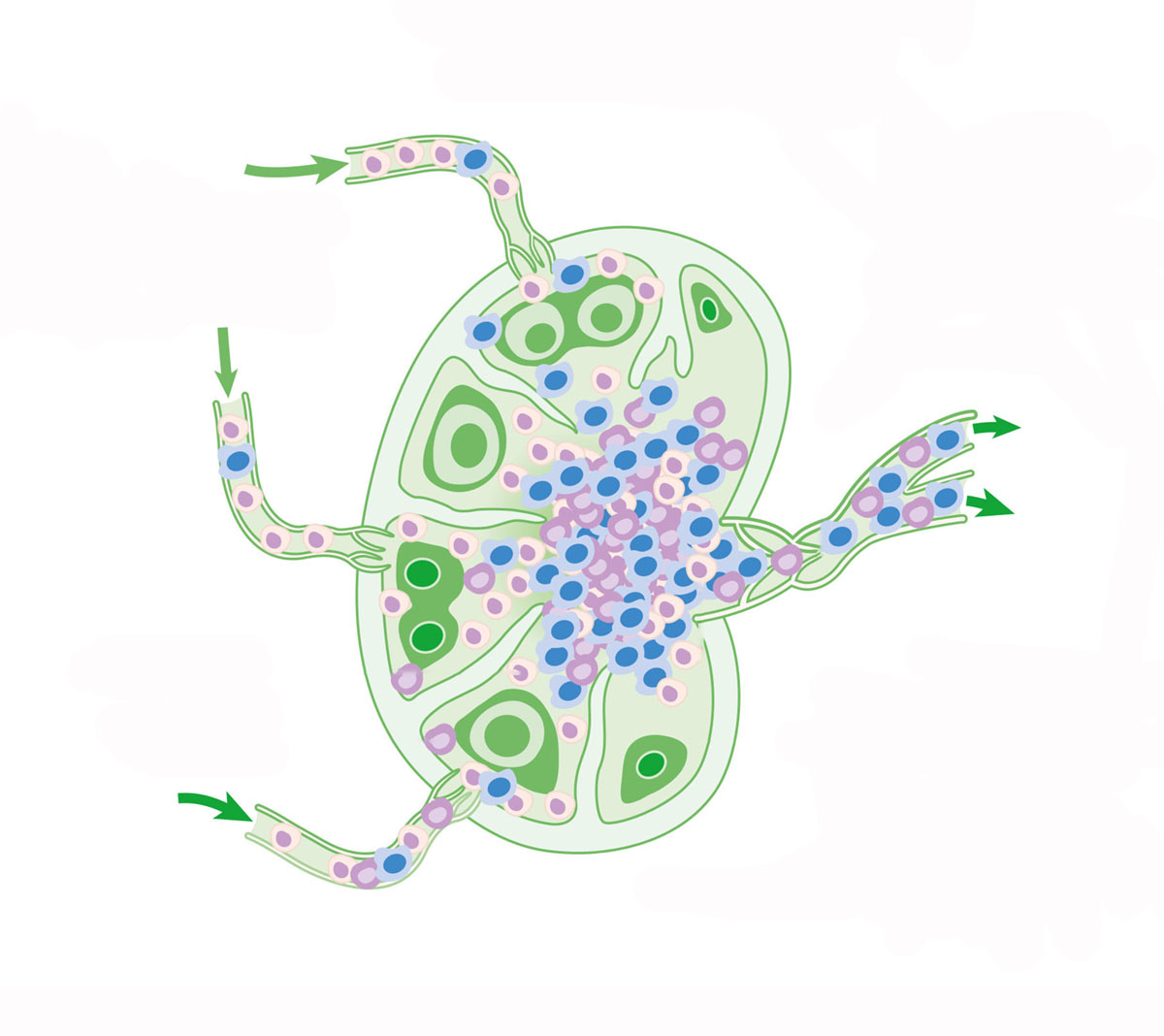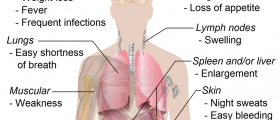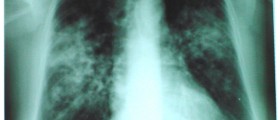Lymph Node Cancer
Lymph node cancer, or lymphoma, occurs due to abnormal growth of white blood cells within lymph nodes. This cancer affects the lymphatic system in the body, which is an integral part of the immune system.
The Lymphatic system includes lymph glands, spleen, thymus, and bone marrow. The lymphatic system transports clear fluid called lymph that consists of white blood cells known as lymphocytes. Lymphocytes protect the body against viruses and infections. When lymphocytes begin to multiply uncontrollably that results in lymph node cancer.
Lymph node cancer accounts for approximately 5% of all cancers. Men are predominantly affected by this cancer. It mostly affects people between 15 and 34 years of age, but all age groups are at risk.

- Lymph nodes are initial sites for cancer metastasis in many solid tumors. However, their role in cancer progression is still not completely understood. Emerging evidence suggests that the lymph node microenvironment provides hospitable soil for the seeding and proliferation of cancer cells.
- Several studies have elucidated how tumor cells are attracted to the lymph node by chemokine signals that are often secreted by stromal or immune cells in the lymph node microenvironment. In addition to attracting tumor cells to the lymph node, chemokines play an important role in modulating immune or stromal cell activity. Furthermore, the role of lymphatic vessels and lymphangiogenesis in altering the local inflammatory response and promoting an immunosuppressive microenvironment in the lymph node is critical for tumor cell dissemination to this organ.
- The lymphatic vasculature is a series of vessels throughout the body that play important roles in tissue homeostasis, fluid balance, immune function, absorption of dietary fat and lipid transport. In addition to their role in normal physiology, lymphatic vessels play critical roles in pathological conditions including inflammation and cancer.
- Naïve lymph nodes are the site of immune regulation where foreign, pathogenic or self-antigens accumulate. Optimal interactions between antigen-loaded-dendritic cells (DCs) and effector T lymphocytes in the lymph node facilitate adaptive immune responses that eliminate foreign and pathogenic antigens. In cancer, functional lymphatic vessels on the periphery of tumors are the physical connection between the primary tumor and SLNs. Rogue tumor cells have evolved ways of evading immune surveillance mechanisms in the lymph node and thus are able to successfully colonize and proliferate in this metastatic site.
- Primary tumor resection and axillary lymph node dissection (ALND) have been part of the standard treatment for breast cancer patients with metastases in the SLN. These surgeries attempt to eliminate all disease provided the cancer is in the early stages and has not metastasized to distant organs. However, ALND has several devastating short-term and long-term side effects including seromas, infections, reduced arm movement and lymphedema.
- Controlling the size of lymph node metastasis is important since recent clinical data have shown that breast cancer patients with micrometastases (?2 mm) in their SLNs have a reduced incidence of distant metastasis compared to those with macrometastasis.
Symptoms of Lymph Node Cancer
There are two types of lymph node cancer, Hodgkin’s cancer and Non-Hodgkin’s cancer, both with similar symptoms.
Swollen Lymph Nodes
This is the most common symptom that can be early noticed. Swelling of the lymph nodes occurs in the armpits, abdomen, sides of the neck, and groin area. Swollen lymph nodes feel like enlarged bumps that can be tender to touch when affected by infections. Even though swollen lymph nodes can be a symptom of various medical conditions, this must be reported to a doctor as soon as possible.
Pain
Swollen lymph nodes may cause pain when an infection is involved. They may be painful to touch. This pain can worsen after drinking alcohol. Pain in the abdomen and feeling of fullness also occur when lymphoma progresses, and the spleen becomes inflamed and swollen. Back pain can be another present symptom.
Fever
Slightly increased body temperature may occur in some patients affected by lymph node cancer. This fever may sometimes result from viral or bacterial infection. A weakened immune system can also lead to low-grade fever, which is followed by chills, night sweats, muscle weakness, and pain.
Problems of Gastrointestinal Tract
The loss of appetite as well as the weight loss occurs with the progression of lymph node cancer. Swollen abdomen and intestines result in bloating sensation, which is the main reason for appetite loss.
The loss of appetite may also occur due to fluid retention (edema) or difficulty in bowel movements. When the cancer spreads, appetite loss is usually accompanied by indigestion, nausea, vomiting, and rapid weight loss.
Cognitive Symptoms
In some cases, the lymph node cancer may spread to the brain and cause behavioral changes, problems with focusing, headaches, seizures, and general weakness.
Additional Symptoms
Other symptoms of lymphoma cancer include lethargy or fatigue, itching, chest pain, and coughing.
- www.nhs.uk/conditions/non-hodgkin-lymphoma/symptoms/
- www.cancer.org/cancer/types/non-hodgkin-lymphoma/detection-diagnosis-staging/signs-symptoms.html
- Photo courtesy of Andrewmeyerson by Wikimedia Commons: commons.wikimedia.org/wiki/File:Lymph_Node_Diagram_Unlabeled.jpg

















Your thoughts on this
Loading...